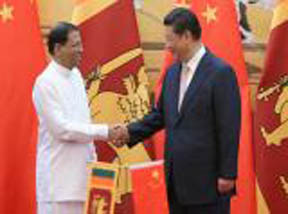 BEIJING: Sri Lanka is of great importance to China’s strategic interests in the Indian Ocean as Pakistan cannot provide a strong foothold due to its “calamitous state” of security, state media here said today, underlining Beijing’s concern in this regard for the first time.
BEIJING: Sri Lanka is of great importance to China’s strategic interests in the Indian Ocean as Pakistan cannot provide a strong foothold due to its “calamitous state” of security, state media here said today, underlining Beijing’s concern in this regard for the first time.
“Currently, the China-funded constructions in Pakistan cannot serve as a strong foothold for China, given the calamitous state of Pakistan’s security,” said one of the two articles in the state-run Global Times coinciding with the visit of Sri Lankan Prime Minister Ranil Wickramasinghe here.
“Sri Lanka can be of great importance for China in the security strategic layout in Indian Ocean. It will not only provide security assurances for nearby navigation channels, but will also promote the 21st Maritime Silk Road,” it said.
India has not yet endorsed the MSR due to concerns over its potential for China to take dominant role in Indian Ocean.
Besides a foothold in Sri Lanka, China looks to gain access to the Indian Ocean through its USD 46 billion economic corridor with Pakistan connecting its Xinjiang with the strategic Gwadar port in Arabian Sea.
Gwadar location also provides an opening to the Indian Ocean.
Blaming India for stalling of the USD 1.5 billion Colombo Port City project which was kept on hold by the present Maithripala Sirisena government for a year, the report said “apart from partisan politics in Sri Lanka, pressure from India has also been playing a crucial role in suspending the project”.
“New Delhi is often biased when viewing Chinese investment in South Asia. New Delhi’s anxiety stems from its suspicion that China is making an attempt to contain India. Despite the fact that neither Beijing’s investment to Sri Lanka nor the latter’s economic development will do any harm to India, New Delhi is still obsessed with the idea that China might create a military encirclement around India,” it said.
“The argument within the country over being pro-India or pro-China might gradually calm down along with Wickramasinghe’s China tour,” it said.
The report also said, “New Delhi does have a huge influence on Colombo, yet the relationship between Sri Lanka and China has not infringed on India’s interests. Colombo is now well aware that neither pro-India nor pro-China is the appropriate policy, and the best option is to keep a good relationship with all major powers.”
While the report written by an official think-tank highlighted Sri Lanka’s dilemma in pursuing its Port City project, another report in the same daily based on interview with Ahsan Iqbal, Minister of Planning, Reform and Development in Pakistan focusing on USD 46 billion China-Pakistan Economic Corridor (CEPC) spoke of concerns both in Beijing and Islamabad over its efficacy considering the state of affairs in Pakistan due to recurring terrorist attacks by home grown groups.
Iqbal is also in-charge of implementation of CEPC.
“Although treasured as an all-weather friendship and an iron brotherhood,” the Sino-Pakistani relationship does not really live up to this reputation in economic terms.
“For example, China only ranks 16th among all direct investors in Pakistan,” it said, adding the CEPC which is scheduled to be finished by 2025 was expected to address the deficit.
“There was a heated debate in Pakistan about the CPEC, which aroused some concerns in China. However, the disagreement is not about the feasibility of the project, but how to divide the big cake as all regions in Pakistan want to maximize their profits from the project. This is quite common for a multi-party country,” it said.
“We cannot deny that the possibility of side effects exists during the implementation of a mega project like the CPEC. For example, environmental concerns exist as both sides are engaged in gigantic cross-border infrastructure projects. Chinese products, by relying on their competitive advantage, could impact Pakistani brands, and security issues might make Chinese companies think twice before getting involved,” it said.
“But these concerns have been informed and shared by the leadership of both countries at the initial stage of the implementation of the CPEC. Political consensus over mutual concerns could result in constructive official involvement in specific problems,” it said.
“The CPEC will probably form a new regional geopolitical dynamic. We hope that certain countries that hold a narrow-minded perspective on the project could change their mind, and engage in the project as a constructive player,” it said, apparently referring to India, which has objected to the project as it goes through Pakistan-occupied-Kashmir. –PTI





